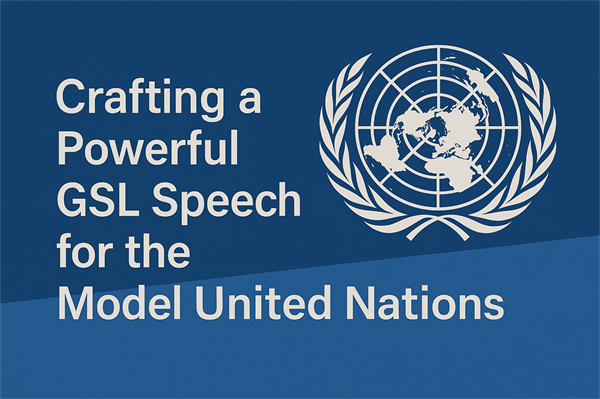Model United Nations: Shaping Tomorrow’s Global Leaders
- Get link
- X
- Other Apps
In a world that is becoming increasingly interconnected, the need for strong diplomatic communication, informed decision-making, and cross-cultural understanding has never been greater. One of the most effective platforms for cultivating these skills among students is Model United Nations (MUN). From high school classrooms to large international conferences, MUN has evolved into a transformative experience that inspires young people to think critically, speak confidently, and lead responsibly.
But what exactly is MUN, and why has it become such an influential global educational movement? Let’s explore.
What Is Model United Nations?
Model United Nations is an academic simulation of the United Nations where students, known as delegates, represent different countries and debate real-world global issues. Committees mirror actual UN bodies, such as the Security Council, Human Rights Council, or General Assembly. Each delegate researches their assigned country and prepares speeches, arguments, and resolutions based on that country’s policies.
Through structured debate, negotiation, and collaboration, students learn how the real UN functions—while also developing essential skills that go far beyond the conference room.
Why Students Participate in MUN
For many students, MUN becomes more than just a school activity—it is a gateway to personal growth, global awareness, and career exploration. Here are the key reasons MUN is so impactful:
1. It Builds Confident Public Speakers
Public speaking is at the heart of every MUN conference. Delegates deliver opening speeches, respond to moderations, and negotiate in unmoderated caucuses. Even shy students eventually find their voice, learning how to speak with structure, clarity, and persuasion.
2. It Develops Critical Thinking
Every agenda in MUN is complex—whether it’s climate change, refugee crises, cybersecurity, or nuclear weapons. Delegates must analyze problems, build solutions, and defend them under pressure. This strengthens analytical thinking and problem-solving abilities.
3. It Teaches Diplomacy and Negotiation
MUN is not about arguing aggressively; it’s about finding common ground. Delegates learn how to negotiate respectfully, form alliances, and write resolutions that balance multiple interests. These diplomatic skills hold lifelong value in both professional and personal situations.
4. It Encourages Global Awareness
To represent a country effectively, delegates must understand its political system, economy, culture, and foreign policy. This research deepens students’ awareness of global conflicts, international cooperation, and humanitarian challenges.
5. It Fosters Leadership and Teamwork
At its core, MUN is collaborative. Delegates work in blocs, draft documents together, and strategize collectively. Through this process, students learn how to lead, how to listen, and how to coordinate diverse perspectives.
Inside a Typical MUN Conference
A Model United Nations conference usually spans one to three days and follows a structured format. Here is a glimpse of what delegates experience:
1. Opening Ceremony
The event begins with a formal introduction, often by the Secretary-General or faculty advisor. Delegates learn about the conference’s theme and expectations.
2. Committee Sessions
This is where the core debate happens. Sessions typically include:
-
Roll Call
-
Setting the Agenda
-
General Speakers’ List
-
Moderated Caucuses
-
Unmoderated Caucuses
-
Drafting of Working Papers
-
Resolution Writing
-
Voting Procedure
During these sessions, delegates deliver speeches, respond to crises, negotiate, and collaborate on written documents.
3. Social Events
Many conferences include socials to allow delegates to unwind and network. These events help build friendships and cultural connections beyond the academic forum.
4. Closing Ceremony and Awards
Outstanding delegates receive awards such as:
-
Best Delegate (BD)
-
High Commendation (HC)
-
Special Mention (SM)
-
Best Position Paper
Awards recognize exceptional research, leadership, diplomacy, and communication.
How MUN Helps Shape Future Careers
MUN is not only valuable academically—it can also significantly influence future career paths. Many alumni move into fields such as:
-
International relations
-
Law
-
Public policy
-
Journalism
-
Business and management
-
Politics
-
Diplomacy and foreign service
The skills gained in MUN—persuasive speaking, negotiation, writing, and teamwork—are universally relevant. Employers often appreciate candidates with MUN experience because it demonstrates initiative, global thinking, and leadership potential.
Tips for New MUN Delegates
If you’re starting your MUN journey, here are some tips to succeed and enjoy the experience:
1. Research Thoroughly
Good research is the foundation of effective debate. Understand your country’s views, statistics, history, and policies deeply.
2. Write a Strong Position Paper
A clear, well-structured position paper not only impresses chairs but also helps you prepare your strategy.
3. Speak Early, Speak Often
The more you speak, the more confident you become. Don’t fear making mistakes—every delegate starts somewhere.
4. Be Friendly and Diplomatic
MUN is about cooperation. Build alliances, listen to others, and avoid dominating conversations.
5. Think in Solutions, Not Problems
Delegates who propose practical, well-researched solutions stand out in committee.
Why MUN Matters Today
In a world facing challenges like climate change, war, inequality, and digital threats, MUN trains students to think globally and act responsibly. It encourages young people to envision a more peaceful, sustainable future—and equips them with the tools to help create it.
More importantly, MUN teaches students that leadership is not about power; it is about empathy, communication, and willingness to understand diverse perspectives.
Conclusion
Model United Nations is far more than a student activity—it is a transformative learning experience. It empowers young people to become informed citizens, confident speakers, and compassionate leaders. Whether you aim to pursue diplomacy or simply want to grow personally, MUN offers a platform to challenge yourself, engage with global issues, and connect with peers from around the world.
If you ever get the chance to participate in MUN, take it wholeheartedly. You might walk into the conference room as a student—but you will walk out with the mindset of a global leader.
- Get link
- X
- Other Apps


Comments
Post a Comment